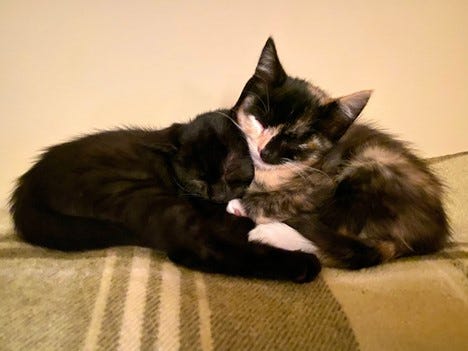The Cat Will Mew, and the Dog Will Have His Day
Did Shakespeare Know About the Divine Feminine and the Divine Masculine?

There’s no denying that many of us feel the deep division in today’s world. It’s been around for thousands of years, but it is now so front and center that even the most determined humans can no longer look away. I don’t believe we’re meant to look away.
I, for one, would rather look for common ground and come together in a way that supports, respects, and appreciates each of us for our individual expressions and unique personalities.
Acknowledge the division, feel it in our core being, and find a way to bridge it.
Shakespeare gave me the idea for this post when I was re-watching my favorite version of Hamlet, starring David Tennant. One of the lines from Act V is:
Let Hercules do what he may,
The cat will mew and the dog will have his day.
Hamlet, act v, scene 1
I love that Shakespeare put dogs and cats in the same rhyming couplet that was Hamlet’s parting shot to Laertes after the death of Ophelia. Both young men, former university buddies, were shattered by her passing, and Laertes blamed Hamlet for it.
It reminded me that we have become pre-occupied with divisiveness, including the kind that involves two of our favorite domesticated companions.
We’ve largely broken ourselves into two mutually exclusive groups: cat people and dog people.
This division began long before the 1980s, but the doomsday scenario of cats and dogs living together was famously likened to mass hysteria by Dr. Peter Venkman in the 1984 film Ghostbusters.
I have to admit that for most of my life, was in the “dog person” camp. When I was 1 year old, my dad brought home a sweet German Shepherd who couldn’t cut it as a K-9 in the police department, and we were best friends for the full 12 years of her life. I remember riding on her back, cuddling with her while reading books in my room, and splashing together in a plastic baby pool every summer.
Growing up, we never had cats, so I learned early on that dogs were our best friends. I had been taught, although I couldn’t say when or by whom, that felines were notoriously antisocial, aloof, and lazy. Why would I want someone like that as a companion?
Boy did I have a lot to learn.
My opinion changed a few years ago when our daughters brought home two kittens from my sister’s farm. The girls had high hopes for friendship and social interaction with their new kitties, but my husband and I were not so sure, given the negative view we, like most non-cat-owners, held of the so-called finicky felines.
My sister was severely allergic to cats and my husband’s grandmother had been deathly afraid of them. They just weren’t a part of our lives, and we didn’t feel like we were missing anything.
Boy were we wrong.
Our daughters’ new kittens, named Remy and Dusty, are fun-loving, intuitive, sociable, smart, charming, curious, playful, affectionate, caring, and always entertaining. They display just as much devotion to their human family members as any dogs we’ve ever had.
The whole family is constantly amazed by these little darlings’ insatiable curiosity and their “up for anything” attitude.
We know they consider us part of the family, too, when they bring gifts (dead mice, moles, squirrels, birds, snakes) to the back door, where they lie beside their trophies as if to say, “See, it’s not that hard, people, you should try catching your own food. Don’t worry, though, because we’re your family and we love you. We’ve got plenty to share.”
Each morning they greeted our 14-year-old Miniature Schnauzer, Baby, by rubbing against her front legs and touching noses with her. Baby and the kittens got along swimmingly, and now that Baby has passed, we recently adopted a dog named Molly. The cats are in the process of welcoming her into the family with affectionate swipes at her head, friendly competition for treats, and lots of chasing around the house.
How could I have been so misled by society to believe that dogs were the only proper 4-legged domesticated companions for humans? Or that cats didn’t love their families as much as dogs did? Or that cats and dogs couldn’t get along?
This answer to this question was inadvertently pointed out to me by a wonderful intuitive and energy coach, Dougall Fraser.
I found Dougall’s online interview with George Lizos, who made some interesting comments about masculine energy, feminine energy, and the ways that societies have pushed the masculine agenda on us for far too long. Historically, many cultures have favored one over the other, as if feminine energy and masculine energy couldn’t coexist.
Like living with cats and dogs.
Lizos’ argument is that the male-dominated paradigm in power for millennia has run its course, and with the recent surge in female empowerment, he believes that we should not let the pendulum swing so far in the other direction that we demonize the divine masculine energy in order to support the long-suppressed female energy.
For more on his theory, and why he is uniquely suited to make the point, see his book Lightworkers Gotta Work. It was an eye-opening read.
It’s sort of like dogs and cats living together, but in the exact opposite of a doomsday scenario.
The cat will mew and the dog will have his day. Shakespeare chose to give them equal billing, and we can, too.
We don’t have to be “dog people” or “cat people.”
We can just be “people.”



